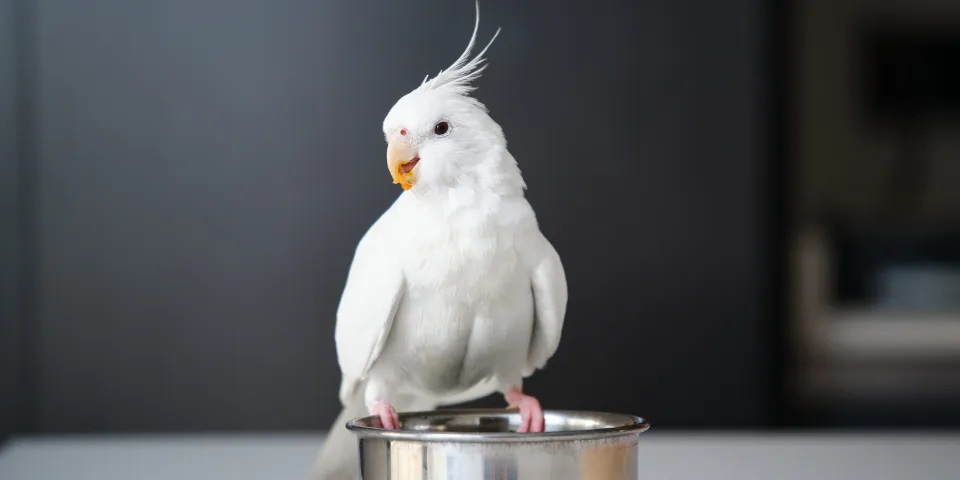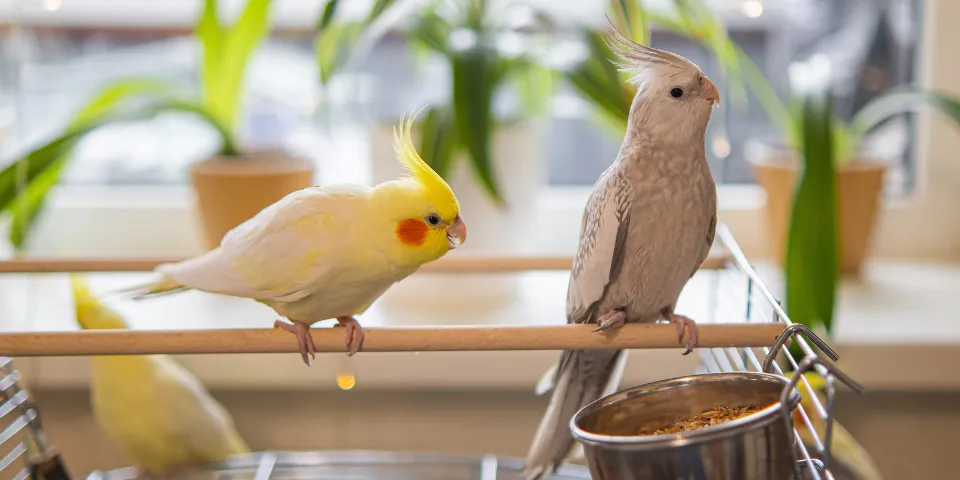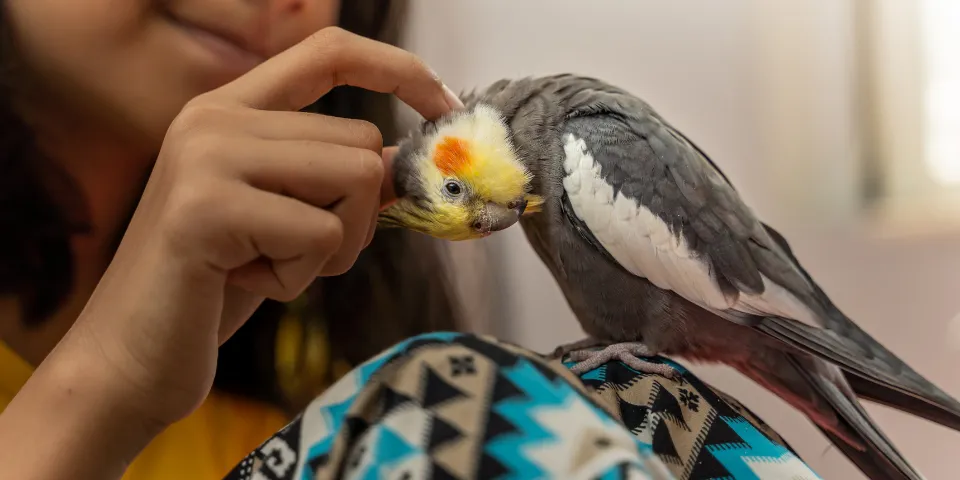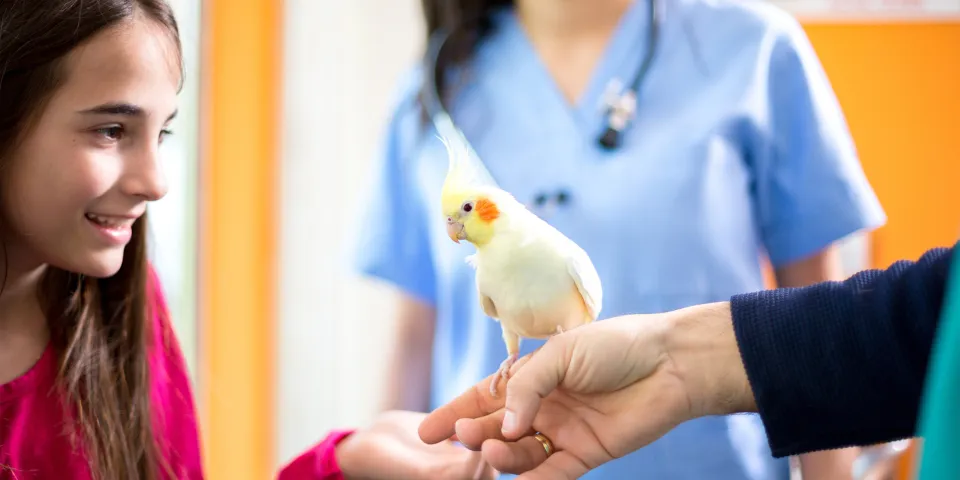Cockatiels are delightful, affectionate birds that make wonderful companions for any household. These small parrots thrive with proper care, including a balanced diet, spacious housing, and plenty of interaction. Whether you’re a new owner or looking to enhance your bird’s well-being, this guide covers essential cockatiel care tips from nutrition to veterinary needs. For starters, explore the best diet for cockatiels to set a strong foundation.
 Albino cockatiel eating from metal dish
Albino cockatiel eating from metal dish
Cockatiel Nutrition 101: Building a Balanced Diet
A nutritious diet is the cornerstone of cockatiel care, supporting energy, feather health, and longevity. While seed mixes are popular, they often lack complete nutrition, leading experts to recommend pellets as the staple.
Seed Mixes vs. Pellets
Many cockatiel owners start with seed mixes due to their appeal, but pellets offer superior balance with vitamins and minerals. Veterinary nutritionists suggest feeding pellets daily, supplemented by about two teaspoons of high-quality seeds without sunflower seeds to avoid obesity. Options like ZuPreem’s Sensible Seed are ideal for this mix, backed by ongoing avian research.
Fresh Fruits and Vegetables
Incorporate fresh produce to boost variety and nutrients in your cockatiel’s diet. Herbs like parsley, dill, and cilantro are favorites, often preferred over leafy greens. Nutrient-packed veggies such as sprouts, broccoli, squash, green beans, and peppers provide essential fiber. For treats, offer berries (blackberries, blueberries, raspberries, strawberries), fruits like figs, kiwi, persimmons, mango, and lychee—these add vitamins without excess sugar. Check out a good diet for cockatiels for more tailored ideas.
Pelleted diets typically eliminate the need for supplements, though cuttlebones benefit egg-laying females by providing calcium.
Hydration Essentials
Fresh, clean water is non-negotiable for cockatiel health—change it daily. Bowls work best for most birds, but bottles suit some; ensure accessibility to prevent dehydration.
 Two cockatiels on perch in cage
Two cockatiels on perch in cage
Cockatiel Housing: Creating a Safe and Stimulating Space
Cockatiels are active flyers despite their size, so housing plays a key role in their physical and mental health as part of comprehensive cockatiel care.
Ideal Cage Size and Setup
Minimum cage dimensions are 20-24 inches square, but larger is better for flight and jumping. Install at least two perches spaced apart to encourage movement. Position the cage in a draft-free, well-lit area away from kitchens to avoid fumes.
Perch Variety for Foot Health
Diverse perches prevent foot issues like pododermatitis. Use natural branches, rope, and platforms of varying diameters to mimic wild perches, promoting strong muscles and joints.
Toys for Enrichment
Toys are vital for cockatiel care, combating boredom and supporting beak health.
Foraging and Chew Toys
Hide treats in foraging toys to stimulate problem-solving. Chew-safe wood or fibers satisfy natural instincts.
Interactive and Swing Options
Bells, mirrors, and swings provide auditory and physical fun. Rotate toys every two weeks to maintain interest.
Learn about food for cockatiel bird options that pair well with play.
 Woman petting cockatiel perched on her shoulder
Woman petting cockatiel perched on her shoulder
Bonding and Playtime: Strengthening Your Connection
Daily interaction builds trust in cockatiel care routines. Start with short, positive sessions to let your bird adjust.
Clicker training uses clicks paired with treats for positive reinforcement, enhancing communication and tricks. Respect your bird’s pace—patience fosters a strong bond.
Fun Playtime Activities
- Interactive Play: Dangle toys or roll balls for chasing.
- Obstacle Courses: Arrange safe items for navigation.
- Foraging Fun: Conceal cockatiel food diet treats.
- Music Time: Play soft tunes or use safe instruments.
- Quality Chats: Talk, sing, or mimic calls.
Watch body language to avoid overexertion. Discover bird seed nutrition for rewarding foraging sessions.
 Young girl with pet cockatiel at veterinarian
Young girl with pet cockatiel at veterinarian
Veterinary Care: Proactive Health for Longevity
Find an avian vet before bringing home your cockatiel—it’s a proactive step in cockatiel care.
Routine Checkups
Annual exams include physicals, X-rays, and bloodwork to catch issues early.
Emergency Signs
Act fast on symptoms like excessive sleep, abnormal droppings, appetite loss, labored breathing, or regurgitation—birds hide illness well.
Caring for cockatiels rewards with years of joy through dedicated nutrition, enriching housing, bonding, and vet care. Consult Dr. Veronica Pardini, DVM, CertAqVET, or similar experts for personalized advice. Start implementing these tips today for a thriving feathered friend!
